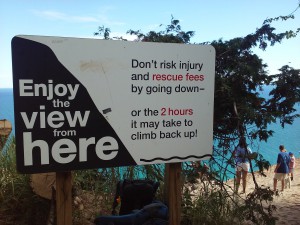The math class was not only hard, it also seemed pointless. I had no interest in it, and I could see no time in the immediate or distant future where I would have any use for this skill (I was right, btw). So I asked the Dean of Students why I had to take the class.
He replied, “Because the Ohio Board of Education says you have to.”
Now I don’t mean to sound flippant or snarky here, although my vexation with lack of consciousness often makes me seem peevish. What he had essentially said was, “I get paid every Friday by this system, the system says I have to make you do this, so I am going to execute those orders, and it’s not my job to question them.” This is a case of mechanics, that is, just blind obedience by a cog to a laid out system, ignoring reasons to not do it. He had chosen this, rather than a state of consciousness. I can see his point. Shutting down the questioning infinite mind generally makes life easier.
A few years later I found myself at a fancy dancy music school. The following may sound ridiculous, but it actually happened: I took Music Theory 101, as everyone had to do, and for 5 months all we did was study the rules of Gregorian Chant counterpoint. This is the music you hear monks singing in monasteries, from the middle ages.
Now bear in mind, there was no discussion of why this music existed, or of the big picture goal of how to best replicate the mood of church in France in 1300, and work backwards from there. No, instead, someone had taken 300 Gregorian Chants, and had done a general analysis of how the notes went from here to there, making up a series of rules, so that if you followed them (or just programmed them into a computer) while putting pairs of notes on a musical staff, something would result that would sound very much like Gregorian Chant.
This may have some practical application somewhere, but I never found it. It did not create mastery, only a shallow illusion of it. Its primary purpose was to be an exercise in obedience, and by obeying, acquiring a sense of belonging, amongst all the other people who had also blindly obeyed the teacher. This exercise in futility cost me something like $3,000 in today’s dollars.
This mechanical view, of disregarding the unique creative potential of each person and instead just making everyone toe the same exact line of a system, is ubiquitous in human history. Similar sorts of systems are in play all the time, e.g., standardized tests. Any number of thinkers like John Holt have refuted their effectiveness, the teachers hate them, and Finland has unequivocally refuted their effectiveness. And yet, the system, of getting paid to administer repetitive tasks, doing so in blind obedience, persists.
For me, as a speaker/consultant, it is not a lack of ideas or solutions that is the problem for my clients. These already exist in plentiful amounts. The hard part is making the transition in my audience and clients– and yes, also in myself– from mechanical obedience to open perceptions and consciousness. And this is hard, because unlike mechanical obedience, consciousness is a state where one can feel pain. It is often very uncomfortable.
Blind obedience has this wonderful reward, in that when you shut down your broader consciousness, you become numb to feeling– your own and that of other people. If you are in pain, and most of us are, it is a fantastic immediate relief, but over time, the side effects get worse and worse.
As a speaker, the only way I can be truly effective and engage my audience is if I go into a state of open consciousness. I have to trust and connect with a bunch of strangers. And there is always the fear– born of endless past traumas of having my vulnerable spirit wounded and shamed– that makes me always hesitate to go full out. But I have to do it.
This is the answer to my endless question of earlier decades, of why some conductors were so much better than others. It was not the mechanical aspect– even though you see many conductors obsessed with “correct’ baton waving technique, and eagerly policing the group for wring notes, and asking the orchestra to “watch me.” A great conductor just stands there and lets you know, by “osmosis,” that he is intently listening and sharing a spiritual communion with you. When that happens, of course, one becomes super-motivated, and all the mechanical stuff just happens by itself. Toscanini had this power to such a degree that even if another conductor was on the podium, if the orchestra sensed his presence in the room they would play for him, not the guy waving the stick.
This is the big question of the age facing us both individually and collectively– are we going to take the assembly line path of suppressing broader consciousness and numbing up, or shall we dare to take the risk, and have the guts, to risk being conscious of the full spectrum of human pain, so that we may also be able to manifest the full spectrum of human potential?










